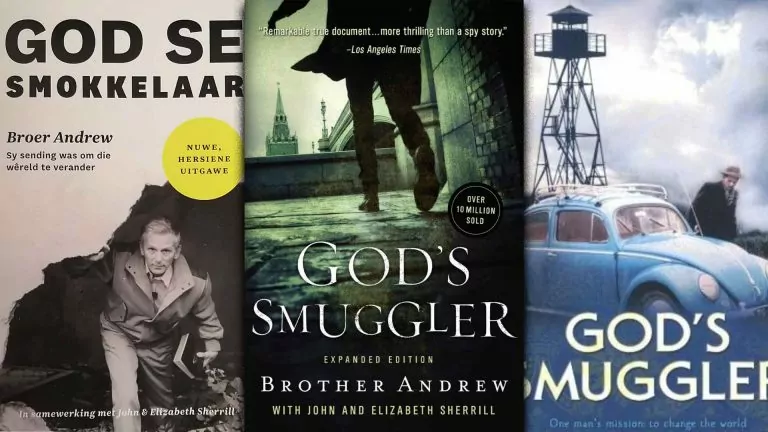by Brother Andrew
Autobiography
1967 / 288 pages
Rating: Good/Great/GIFT
This is an amazing true story about God’s miraculous interventions to get Bibles to his persecuted Church in both Communist countries and Muslim ones.
There are miracles all around us, but the rising sun, our pumping hearts, and babies’ wriggling toes do their thing with such regularity as to seem ordinary to us – we take them for granted. Not so the miracles in God’s Smuggler. Here “Brother Andrew” (1928- ) relates one extraordinary answer to prayer after another: a needed cake delivered by an off-duty postman, money of the right sum arriving at just the right time, the instant healing of Andrew’s crippled ankle.
Then, in his work smuggling Bibles behind the Iron Curtain, this Dutchman came to rely on the extraordinary becoming regular. Border crossings into Communist countries were always tense, but each time Brother Andrew would ask God to “make seeing eyes blind” and again and again God would do so. The same border guards who had just taken apart the car in front of them would simply wave them through or, if they did inspect their cargo, the guards would completely miss the Bibles crammed in everywhere. It was through these regular miracles that God used Andrew and his coworkers to deliver His Word to millions in the persecuted Church.
I’ll share one of his miraculous accounts, which I also shared with my children, about Andrew on an early smuggling trip, this time to Yugoslavia.
“The roads in Yugoslavia were extraordinarily hard on cars. When we weren’t climbing fierce mountain trails, we were fording streams at the bottom of steep valleys. But the worst threat to the little VW was the dust. Dust lay over the unpaved roads like a shroud; it sifted in on us even through the closed windows, and I hated to think what it was doing to the engine. Every morning in our Quiet Time, Nikola and I would include a prayer for the car. ‘Lord, we don’t have either time or the money for repairs on this car, so will you please keep it running?’
“One of the peculiarities of travel in Yugoslavia in 1957 was the friendly road-stoppings that took place. Cars. especially foreign cars, were still such a rarity that when two drivers passed each other, they almost always stopped to exchange a few words about road conditions, weather, gasoline supplies, bridges. One day we were dusting along a mountain road when up ahead we spotted a small truck coming toward us. As it pulled alongside, we also stopped.
“‘Hello,’ said the driver. ‘I believe I know who you are. You’re the Dutch missionary who is going to preach in Terna tonight.’
“‘That’s right.’
“‘And this is the Miracle Car?’
“‘The Miracle Car?’
“‘I mean the car that you pray for each morning.’ I had to laugh. I had mentioned the prayer in a previous meeting; the word had obviously gone on ahead. ‘Yes,’ I admitted, ‘this is the car.’
‘Mind if I take a look at her? I’m a mechanic.’
“‘I’d appreciate it.’ I had put gasoline in that engine, and that was literally all since I had crossed the border. The mechanic went around to the rear and lifted the hood over the motor. For a long time he stood there, just staring.
“‘Brother Andrew,’ he said at last, ‘I have just become a believer. It is mechanically impossible for this engine to run. Look. The air filter. The carburetor. The sparks. No, I’m sorry. This car cannot run.’
“‘And yet it’s taken us thousands of miles.’ The mechanic only shook his head. ‘Brother,’ he said, ‘would you permit me to clean your engine for you and give you a change of oil. It hurts me to see you abuse a miracle.’ Gratefully we followed the man to his village a few miles from Terna. We pulled behind him into a little courtyard filled with pigs and geese. That night while we preached he took the engine apart, cleaned it piece by piece, changed the oil, and by the time we were ready to leave the next morning, presented us with a grinning new automobile. God had answered our prayer.”
Cautions
While reading this to my girls, I told my children we shouldn’t understand the many miracles Andrew experienced as evidence that he was always acting wisely and praying as he should – he himself acknowledged that God honored one of of his prayer requests despite how he prayed.
There’s an instance or two early on that reminded me of the old joke about a man caught up in a flood who had to take refuge on his roof and prayed for God to save him. As he was praying a boy rowed by in a boat and asked if the man wanted to join him but the man replied that he didn’t need the boy’s help because God would save him. Then a helicopter came, the pilot offering a lift, only to get the same response. Eventually, the waters rose and the man drowned. When he got to heaven the man wanted to know why God didn’t save him, and God told him He had, sending a boy in a boat and a pilot in a helicopter. Similarly, Brother Andrew turns down offered help (for a needed cake), only to later receive help of an even more miraculous sort (a cake, unsolicited, arriving in the mail, just in time). I don’t think that we have to take all of this prescriptively, as what we also should do – we can get in the boat or helicopter, or take someone up on their offer to bake a cake, and not wait for even more miraculous intervention. But we should most certainly take it descriptively as evidence of God’s great love for his persecuted Church. And, when we understand God’s great love for His children, and His great power, then we too may be willing and eager to risk much to show His love to others.
Conclusion
We can also appreciate how aware Andrew was of his complete reliance on God. We all are, all the time, but when times are good we so often forget. Living his life in danger so much of the time, Brother Andrew wasn’t nearly so forgetful.
This would also be a valuable tool to impress on a younger generation that while in their lifetimes it has primarily been the culture that has been the biggest enemy of God’s Church, in many places, and at many times, it has been the government.
I would recommend this primarily for adults, because it does take some discernment to think through where Brother Andrew is relying on God in ways that we too should imitate, and where he might be getting close, or even crossing the line, into testing God. For a younger audience, just read it to them and discuss afterward. Then it could be good for as young as 8.
This is one of the books I read for RP’s 52 in 2022 challenge.











